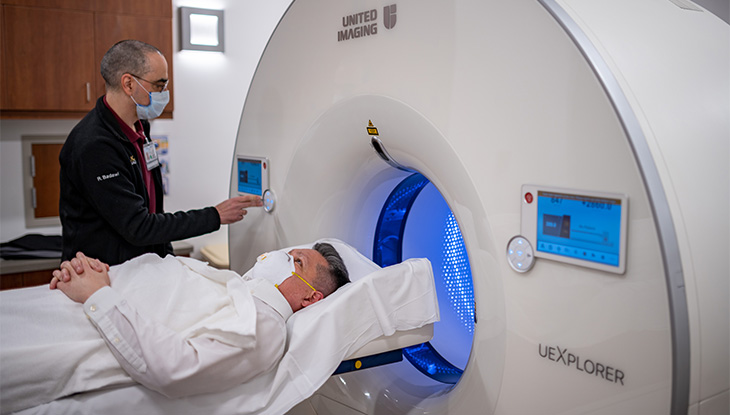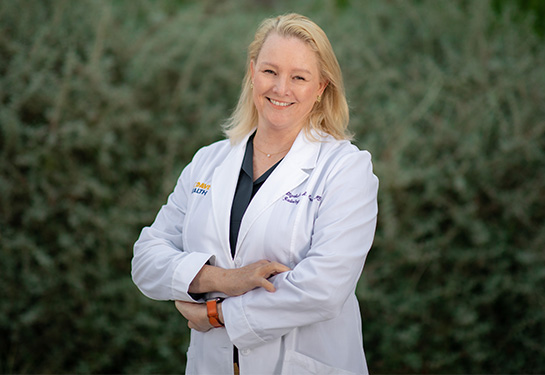Elizabeth Morris named 2024 Gold Medalist by Society for Breast Imaging
UC Davis Health Professor and Chair of the Department of Radiology Elizabeth Morris has been selected as the Society of Breast Imaging (SBI) 2024 Gold Medalist. The announcement was made at the Radiological Society of North America (RSNA) Scientific Sessions and Annual Meeting recently in Chicago.
Morris’ research focuses on how to use newer techniques, such as magnetic resonance imaging (MRI), for early breast cancer detection. In collaboration with her colleagues, she has written over 230 papers, 40 chapters and 5 books about breast diseases with an emphasis on the use of MRI. She has also received grants from RSNA, National Cancer Institute, U.S. Department of Defense, Susan G. Komen Foundation and Breast Cancer Research Foundation.
In announcing the award, SBI also said Morris has a distinguished record as a radiology and breast imaging leader. After graduating summa cum laude from UC Davis with a degree in biochemistry, she received her medical degree from UC San Francisco and completed her residency at Weill Cornell Medical College. She also received a body and breast imaging fellowship at Memorial Sloan Kettering Cancer Center, where she remained on the faculty until December 2020, becoming the chief of the breast imaging service and Larry Norton Endowed Chair.
Morris is a fellow of SBI, the American College of Radiology and the International Society of Magnetic Resonance in Medicine. She is also a past president of SBI.
Morris will receive the gold medal during the 2024 SBI Breast Imaging Symposium on April 12, 2024 in Montreal, Canada.
Dense breast study co-authored by Morris highlighted at RSNA
Morris also shared results from a Bayer-funded study that she co-authored at the RSNA meeting. The work was published in the Journal of Medical Economics. It analyzes the cost effectiveness and the ability to provide supplemental imaging for women with dense breasts at average or intermediate risk of breast cancer.
The results showed that MRI and contrast-enhanced mammography offer the best clinical outcomes compared to routine screening alone. Morris said the findings are aligned with ongoing efforts in Congress to improve access to supplementary breast cancer screening.
“Reintroduced earlier this year, the Find It Early Act seeks to ensure coverage of supplemental screening with no cost-sharing for certain individuals at greater risk, including those with dense breasts. The results of this study provide important evidence that reinforces the value of this act. The analysis also helps build much-needed consensus around the preferred supplemental screening modalities that, in combination with improved access, will help contribute to the impact of life-saving breast cancer screening,” Morris said.

More recognition for UC Davis Health at RSNA meeting
Also generating excitement at the RSNA meeting was a presentation by the UC Davis Department of Radiology that detailed the journey to develop EXPLORER, the world’s first total-body positive emission tomography (PET) scanner. EXPLORER provides comprehensive images of the entire body in seconds.
The presenters included Ramsey Badawi, professor and vice chair of research for the radiology department, Lorenzo Nardo, director of nuclear medicine and theranostics for the department, and Simon Cherry, professor emeritus with the UC Davis Department of Biomedical Engineering.
RSNA’s coverage of the conference included the UC Davis team’s collection of images and animation generated by EXPLORER that depict the human body’s immune response after COVID-19 infection. The research conducted with EXPLORER features dramatic imaging of immune T cell distribution throughout the body. This helps researchers better understand how the body responds to viral infections and how long-term protection against re-infection may be possible.
UC Davis Health is improving lives and transforming health care by providing excellent patient care, conducting groundbreaking research, fostering innovative, interprofessional education, and creating dynamic, productive partnerships with the community. For more information, visit health.ucdavis.edu.

